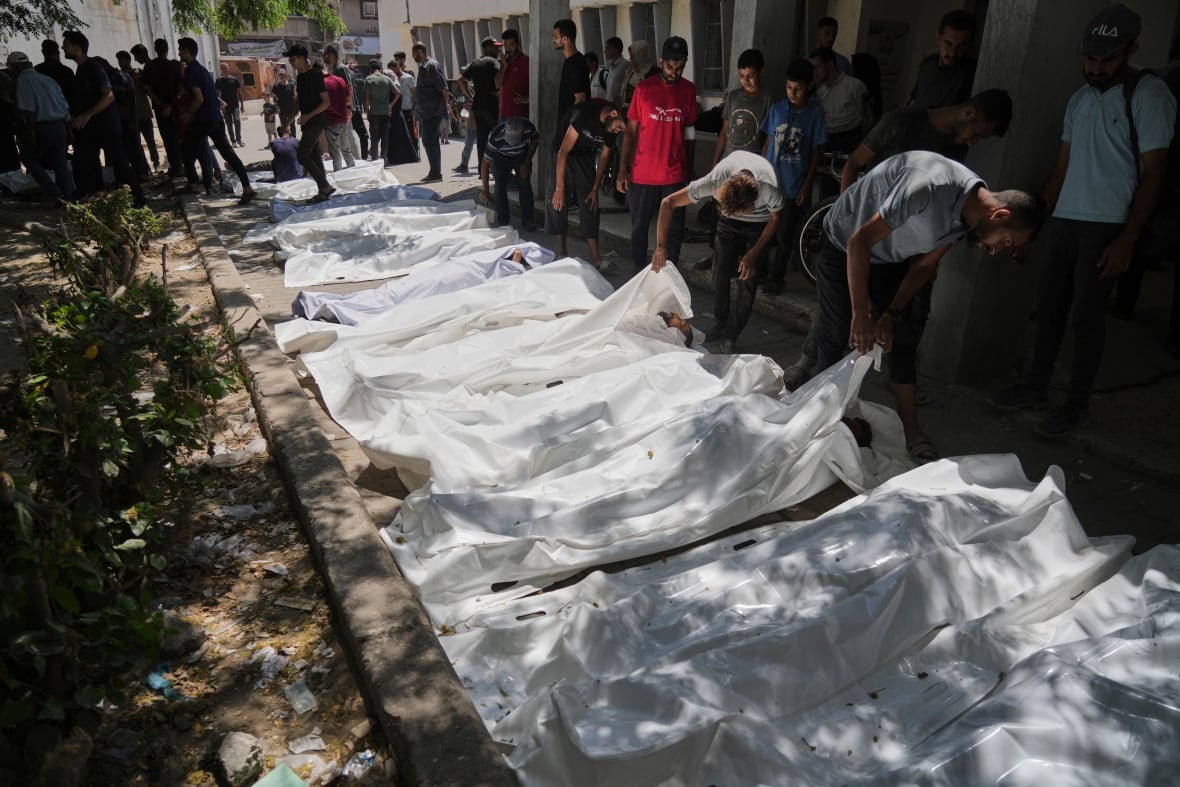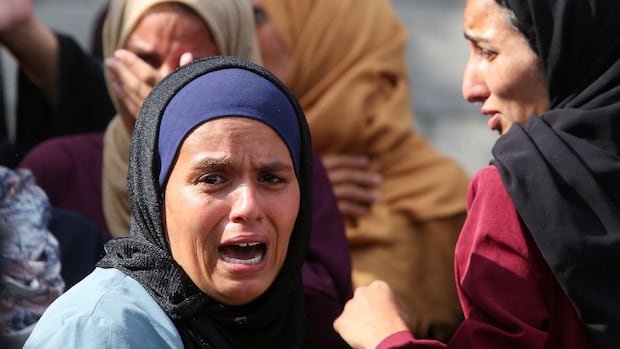At least 73 Palestinians killed trying to access humanitarian aid, says Gaza Health Ministry
No breakthroughs in ongoing ceasefire talks between Israel and Hamas in Qatar
At least 73 people were killed while attempting to access aid at locations across Gaza on Sunday, the Health Ministry in the Palestinian territory said.
The Israeli military said that soldiers had shot at a gathering of thousands of Palestinians in northern Gaza who posed a threat and that it was aware of some casualties. But it said the numbers being reported by teams in Gaza were far higher than the military's initial investigation found.
The military added that it is attempting to facilitate the entry of aid and blamed Hamas militants for fomenting chaos and endangering civilians.
The largest toll, according to the Gaza ministry, was in the northern part of the territory, where at least 67 Palestinians were killed while trying to reach aid entering northern Gaza through the Zikim crossing with Israel, according to the ministry and local hospitals.
More than 150 people were wounded, with some of them in critical condition, hospitals said. Seven Palestinians were also killed while sheltering in tents in Khan Younis, including a five-year-old boy, according to the Kuwait Specialized Field Hospital, which received the casualties.
It wasn't immediately clear whether they were killed by the Israeli army or armed gangs or both. But some witnesses said that the Israeli military shot at the crowd.
The killings in northern Gaza didn't take place near aid distribution points associated with the Gaza Humanitarian Fund (GHF), a U.S.- and Israel-backed group that hands out food packages to Palestinians. Witnesses and health workers say hundreds of people have been killed by Israeli fire while trying to access the group's distribution sites.

Meanwhile, the Israeli military published new evacuation warnings for areas of central Gaza on Sunday, in one of the few areas where the military has rarely operated with ground troops.
The evacuation cuts access between the city of Deir al-Balah and the southern cities of Rafah and Khan Younis in the narrow enclave.
The announcement came as Israel and Hamas have been holding ceasefire talks in Qatar, but international mediators say there have been no breakthroughs.
Israeli Prime Minister Benjamin Netanyahu has repeatedly stressed that expanding Israel's military operations in Gaza will pressure Hamas to negotiate, but negotiations have been stalled for months.
Earlier this month, the Israeli military said that it controlled more than 65 per cent of the Gaza Strip.
Cutting off access
The area of Gaza under the evacuation order is where many international organizations attempting to distribute aid are located.
The United Nations has been in contact with Israeli authorities to clarify whether UN facilities in southwestern Deir al-Balah are included in Sunday's evacuation order, according to a UN official who spoke on the condition of anonymity because he wasn't authorized to speak to the media.
In previous instances, UN facilities were spared from evacuation orders, the official said. The evacuation announcement covers an area stretching from a previously evacuated area all the way to the coast and will severely hamper movement for aid groups and civilians in Gaza.
Israeli military spokesman Avichay Adraee warned that the military will attack "with intensity" against militants. He called for residents, including those sheltering in tents, to head to the Muwasi area, a desolate tent camp on Gaza's southern shore that the Israeli military has designated a humanitarian zone.
Gaza's population of more than two million Palestinians are in a catastrophic humanitarian crisis.
Hamas triggered the 21-month war when militants stormed into southern Israel on Oct. 7, 2023, killing around 1,200 people and taking 251 others hostage. Fifty remain, but fewer than half are thought to be alive.
Israel's military offensive that followed has killed more than 58,000 Palestinians, according to the Gaza Health Ministry. The ministry is part of the Hamas government but the UN and other international organizations see it as the most reliable source of data on casualties.
The Hostages Family Forum, a grassroots organization that represents many of the families of hostages, condemned the evacuation announcement and demanded that Netanyahu and the Israeli military explain what they hope to accomplish in the area of central Gaza, accusing Israel of operating without a clear war plan.

"Enough! The Israeli people overwhelmingly want an end to the fighting and a comprehensive agreement that will return all of the hostages," the forum said. On Saturday night, during the weekly protest, tens of thousands of protesters marched in Tel Aviv to the branch of the U.S. Embassy, demonstrating for an end to the war.
Humanitarian disaster grows
On Sunday morning, ambulances in front of three major hospitals in Gaza sounded their alarms simultaneously in an urgent appeal to shed light on the hunger crisis in the territory. The Health Ministry posted pictures on social media of doctors holding paper signs about malnourished children and lack of medication.
Zaher al-Wahidi, a Health Ministry spokesperson, said that at least nine children under the age of five have died of malnutrition as of Sunday since the Israel's imposed aid entry blockade in March.
He explained that tracking the deaths of starvation is hard because some could be suffering from other medical conditions that could be worsened when compounded with severe hunger.
In northern Gaza, Shifa Hospital director Abu Selmiyah said that the hospital recorded 79 people who died of malnutrition in the past month.
Israeli bombardments continued to pound the Gaza Strip overnight. Large explosions in northern Gaza were visible from Israel as plumes of fire shot into the sky.


